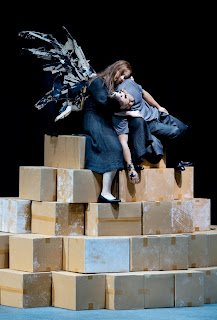Bass Franz-Josef Selig was a comical Daland, his gestures communicating a self-assured corporate personality. Tenor Benjamin Bruns was a similarly good actor, playing the Steersman as Daland's yes-man & leading the male chorus in a jolly company sing-along in act 3. Bass-baritone Samuel Youn has an engaging stage presence & flexible voice & was a young & genial Dutchman. Soprano Ricarda Merbeth was an outgoing, happy Senta. Her singing was forceful & her high notes loud but perhaps pitchless. This Dutchman & Senta looked & behaved like a young romantic couple & were mutually joyful when they discovered they would die together. Tenor Tomislav Muzek was a sympathetic Erik. His voice was high, clear & clean.
All the choral numbers had lively choreography, & the chorus was terrific, sounding unified & spirited & moving together like dancers. They were perhaps the real stars of the show. There was a spectacular use of fire when the Dutchman's sailors appear in act 3. The curtain seems to come down prematurely at the end but then rises to reveal a cynical epilogue in which the lovers' final gesture is turned into a kitschy commodity.
 Conductor Christian Theilemann made his presence known from the 1st sharp attack of the overture. He led a taut, powerfully controlled performance. Even though in a covered pit, the orchestra's sound was dominant. It was unreal hearing the harp coming from a space in the air on the left of the stage. The woodwinds & cellos also sounded amazingly vivid. The audience responded enthusiastically & stamped their feet especially for the chorus, Mr. Youn & Maestro Theilemann, though a single detractor booed both Mr. Youn & Ms. Merbeth. The ovation ran about 10 minutes.
Conductor Christian Theilemann made his presence known from the 1st sharp attack of the overture. He led a taut, powerfully controlled performance. Even though in a covered pit, the orchestra's sound was dominant. It was unreal hearing the harp coming from a space in the air on the left of the stage. The woodwinds & cellos also sounded amazingly vivid. The audience responded enthusiastically & stamped their feet especially for the chorus, Mr. Youn & Maestro Theilemann, though a single detractor booed both Mr. Youn & Ms. Merbeth. The ovation ran about 10 minutes.Die Oper Tatlerin's Dutch-themed attire for the performance included a dress adorned with a tulip design, though she forgot her seat cushion.
§ Der fliegende Holländer
Bayreuther Festspiele 2013
Conductor, Christian Thielemann
Director, Jan Philipp Gloger
Stage design, Christof Hetzer
Costumes, Karin Jud
Lighting, Urs Schönebaum
Video, Martin Eidenberger
Dramaturgy, Sophie Becker
Choral Conducting, Eberhard Friedrich
Daland, Franz-Josef Selig
Senta, Ricarda Merbeth
Erik, Tomislav Muzek
Mary, Christa Mayer
Der Steuermann, Benjamin Bruns
Der Holländer, Samuel Youn
Tuesday 13. August, 06:00 PM



No comments:
Post a Comment